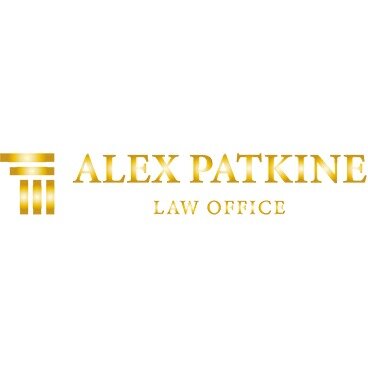Best Labor Law Lawyers in Haifa
Share your needs with us, get contacted by law firms.
Free. Takes 2 min.
List of the best lawyers in Haifa, Israel
About Labor Law in Haifa, Israel
Labor Law in Haifa, Israel, like the rest of the country, encompasses a wide range of legal regulations that govern the relationship between employers and employees. It includes various statutes, regulations, and case law that ensure fair treatment, non-discrimination, and safe working conditions for employees while also providing guidelines for employers regarding hiring, work conditions, and termination procedures. Israel's labor laws are designed to protect workers' rights and promote fair labor practices.
Why You May Need a Lawyer
There are several common situations where people may require legal assistance in the field of Labor Law:
- Unfair dismissal or wrongful termination
- Disputes over wages or salaries
- Workplace discrimination or harassment
- Violation of employment contracts
- Issues related to workplace safety
- Claims for severance pay or pension rights
- Problems with working hours, overtime pay, or rest days
- Collective bargaining disputes
- Immigration and work visa issues for foreign employees
- Understanding and applying various labor regulations and standards
Local Laws Overview
Here are some key aspects of local laws that are particularly relevant to Labor Law in Haifa and Israel in general:
- Employment Contracts: Employers are required to provide written employment contracts to employees, outlining terms of employment including job duties, hours, salary, and benefits.
- Minimum Wage: The minimum wage in Israel is regulated by law and updated periodically to ensure fair compensation.
- Working Hours and Overtime: Standard working hours are regulated, and employees are entitled to overtime pay for work beyond the standard hours.
- Leave Entitlements: Employees are entitled to various types of leave, including annual leave, sick leave, and maternity/paternity leave as per statutory regulations.
- Discrimination and Harassment: Laws protect employees against discrimination based on gender, age, race, religion, and other factors, as well as against workplace harassment.
- Termination and Severance: There are specific procedures and entitlements related to termination of employment, including notice periods and severance pay.
- Health and Safety: Employers are obliged to ensure a safe working environment and comply with occupational health and safety regulations.
Frequently Asked Questions
1. What should be included in an employment contract?
An employment contract should include the employee’s job title, a description of their duties, working hours, salary, benefits, leave entitlements, and the conditions for termination and resignation. Other important terms such as non-compete clauses and confidentiality agreements may also be included.
2. What is the current minimum wage in Israel?
The minimum wage in Israel is updated periodically by the government. As of the latest update, the minimum monthly wage for a full-time position is set at NIS 5,300. It's important to check for the most recent updates from the Ministry of Labor for any changes.
3. How many hours constitute a full working week?
A standard full working week in Israel is 42 hours, typically spread over five or six days. Any hours worked beyond this threshold are considered overtime and are remunerated at a higher rate.
4. What are the entitlements for maternity leave?
Female employees in Israel are entitled to 26 weeks of maternity leave, with 15 weeks paid by the National Insurance Institute. Fathers are also entitled to a portion of this leave under certain conditions.
5. What constitutes unfair dismissal?
Unfair dismissal occurs when an employee is terminated without a valid reason or without due process as stipulated by employment law. This includes dismissals that are discriminatory, without proper notice, or in violation of contract terms.
6. Are there laws protecting against workplace harassment?
Yes, Israel has stringent laws protecting employees from workplace harassment, including sexual harassment. Employers are required to implement measures to prevent harassment and address any complaints promptly.
7. How is overtime pay calculated?
Overtime pay in Israel is 125% of the regular hourly wage for the first two hours of overtime per day, and 150% for any subsequent hours. Different rates may apply for work done on weekends or public holidays.
8. Can an employer change the terms of my employment contract unilaterally?
No, employers cannot unilaterally change essential terms of an employment contract. Any significant changes require the consent of the employee, failing which the change might be considered a breach of contract.
9. What should I do if I face discrimination at work?
If you face discrimination at work, you should document the incidents and report them to your employer or HR department. If the issue is not resolved, you may file a complaint with the Equal Employment Opportunity Commission or seek legal advice.
10. How can I claim severance pay?
Severance pay is usually granted to employees who are terminated after working for at least one year with the same employer. The amount is calculated based on the length of employment. You can file a claim through the labor court if your employer refuses to pay.
Additional Resources
Here are some useful resources and organizations related to Labor Law in Haifa, Israel:
- Ministry of Labor, Social Affairs and Social Services: Offers information on labor laws, regulations, and rights.
- National Insurance Institute: Provides details on employee benefits, including maternity leave, unemployment benefits, and severance pay.
- Equal Employment Opportunity Commission: Addresses workplace discrimination issues.
- Histadrut (General Federation of Labor in Israel): The largest trade union in Israel, offers support and representation for labor issues.
- Local Labor Court: Handles disputes between employers and employees.
Next Steps
If you need legal assistance in Labor Law, here are the steps you can take:
- Document the Issue: Keep detailed records of any incidents or disputes, including dates, times, and relevant communications.
- Consult with a Lawyer: Seek advice from a specialized labor law attorney to understand your rights and options.
- File a Complaint: If necessary, file an official complaint with the relevant governmental body, like the Equal Employment Opportunity Commission or a Labor Court.
- Collect Evidence: Gather all necessary documents and evidence that support your case, such as employment contracts, correspondence, and witness statements.
- Attend Mediation: Consider mediation as a way to resolve disputes without going to court. Many labor disputes are successfully settled through mediation.
- Prepare for Court: If mediation fails, be prepared to go to court. Your lawyer will guide you through the process and represent you during the hearings.
By following these steps, you can effectively address labor law issues and seek the appropriate legal remedies available to you.
Lawzana helps you find the best lawyers and law firms in Haifa through a curated and pre-screened list of qualified legal professionals. Our platform offers rankings and detailed profiles of attorneys and law firms, allowing you to compare based on practice areas, including Labor Law, experience, and client feedback.
Each profile includes a description of the firm's areas of practice, client reviews, team members and partners, year of establishment, spoken languages, office locations, contact information, social media presence, and any published articles or resources. Most firms on our platform speak English and are experienced in both local and international legal matters.
Get a quote from top-rated law firms in Haifa, Israel — quickly, securely, and without unnecessary hassle.
Disclaimer:
The information provided on this page is for general informational purposes only and does not constitute legal advice. While we strive to ensure the accuracy and relevance of the content, legal information may change over time, and interpretations of the law can vary. You should always consult with a qualified legal professional for advice specific to your situation.
We disclaim all liability for actions taken or not taken based on the content of this page. If you believe any information is incorrect or outdated, please contact us, and we will review and update it where appropriate.















